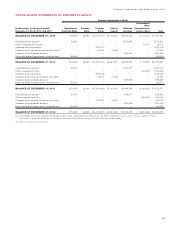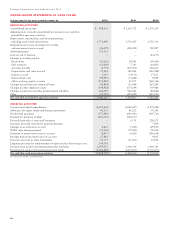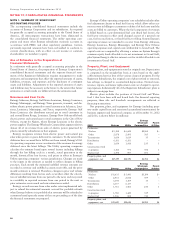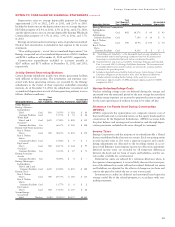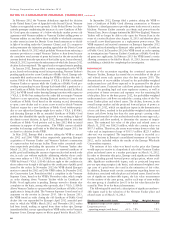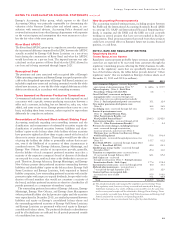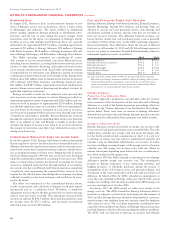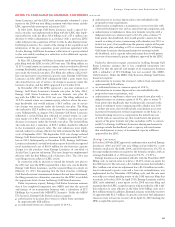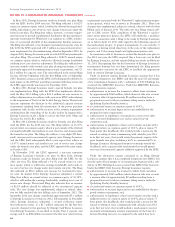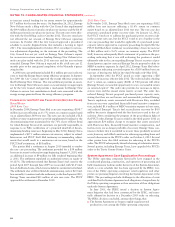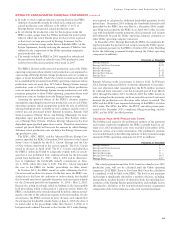Entergy 2012 Annual Report Download - page 62
Download and view the complete annual report
Please find page 62 of the 2012 Entergy annual report below. You can navigate through the pages in the report by either clicking on the pages listed below, or by using the keyword search tool below to find specific information within the annual report.
Entergy Corporation and Subsidiaries 2012
NOTES TO CONSOLIDATED FINANCIAL STATEMENTS continued
In February 2012 the Vermont defendants appealed the decision
to the United States Court of Appeals for the Second Circuit. Vermont
Yankee cross-appealed on two grounds: (1) the Federal Power Act alter-
natively preempts conditioning the issuance of a new Certificate of Pub-
lic Good upon the existence of a below wholesale market power sale
agreement with Vermont utilities or Vermont Yankee’s selling power to
Vermont utilities at rates below those available to wholesale customers
in other states (an issue the District Court found unnecessary to decide
in light of its ruling under the Commerce Clause); and (2) a request to
make permanent the injunction pending appeal that the District Court
entered on March 19, 2012 which prohibits Vermont from enforcing a
statutory provision to compel Vermont Yankee to shut down because
the cumulative total amount of spent fuel stored at the site exceeds the
amount derived from the operation of the facility up to, but not beyond,
March 21, 2012 (a provision the enforcement of which the January 2012
decision had not enjoined). The appeal and cross-appeal remain pending.
In January 2012, Entergy filed a motion requesting that the VPSB
grant, based on the existing record in its proceeding, Vermont Yankee’s
pending application for a new Certificate of Public Good. Entergy sub-
sequently filed another motion asking the VPSB to declare that title 3,
section 814(b) of the Vermont statutes (3 V.S.A. § 814(b)) authorized
Vermont Yankee to operate while the Certificate of Public Good pro-
ceeding was pending because Entergy had timely filed a petition for a
new Certificate of Public Good that had not yet been decided. In March
2012, the VPSB issued orders denying Entergy’s motion with respect to
3 V.S.A. § 814(b) but stating that the order did not require Vermont
Yankee to cease operations, denying Entergy’s motion to issue a new
Certificate of Public Good based on the existing record, determining
to open a new docket and to create a new record to decide Vermont
Yankee’s request for a new Certificate of Public Good (without preju-
dice to any rights that Entergy might have under 3 V.S.A. § 814(b)),
and directing Entergy to file an amended Certificate of Public Good
petition that identified the specific approvals it was seeking in light of
the district court’s decision. In April 2012, Entergy filed its amended
Certificate of Public Good petition and in June 2012 filed its initial
testimony in support of that petition. The VPSB’s current schedule
provides for hearings and briefs to be filed through August 2013, but
no date for a decision by the VPSB.
In May 2012, Entergy filed a motion asking the VPSB to amend
the 2002 and 2006 VPSB orders respectively approving Entergy’s
acquisition of Vermont Yankee and Vermont Yankee’s construction
of a spent nuclear fuel storage facility. These orders contained condi-
tions respectively precluding the operation of Vermont Yankee after
March 21, 2012 absent issuance of a new or renewed certificate of
public good and limiting the amount of spent nuclear fuel stored at the
site, in each case without explicitly addressing whether those condi-
tions were subject to 3 V.S.A. § 814(b). In its March 2012 order the
VPSB had found 3 V.S.A. § 814(b) did not apply to the conditions in
those orders even though it did apply to the certificates of public good
issued by the orders. In November 2012 the VPSB denied Entergy’s
motion to amend the 2002 and 2006 VPSB orders. In December 2012
the Conservation Law Foundation filed a complaint in the Vermont
Supreme Court, based on the VPSB’s November order, which sought
an order shutting down Vermont Yankee while its Certificate of
Public Good application is pending. Entergy moved to dismiss that
complaint on the basis, among other grounds, that 3 V.S.A. § 814(b)
allows Vermont Yankee to operate while its Certificate of Public Good
application is being decided. The Vermont Supreme Court heard oral
argument on the motion in January 2013. Also in January 2013,
the VPSB issued an order closing the old Certificate of Public Good
docket (the one superseded by Entergy’s April 2012 amended peti-
tion) in which the VPSB’s March 2012 and November 2012 orders
had been issued, making an appeal from those orders ripe. Entergy
immediately filed a notice appealing those VPSB orders to the Vermont
Supreme Court. Entergy expects to file its appeal brief in March 2013.
In September 2012, Entergy filed a petition asking the VPSB to
issue a Certificate of Public Good allowing construction at Vermont
Yankee for a diesel generator to provide power in the event of a station
blackout. Vermont Yankee currently can obtain such power from the
Vernon Dam. Due to changes instituted by ISO-New England, Vermont
Yankee will no longer be able to rely upon the Vernon Dam in the
event of a station blackout after August 31, 2013 and therefore plans
to install a new diesel generator as a replacement power source. The
VPSB requested and received comments on Entergy’s September 2012
petition and its relationship to Entergy’s other petition for a Certificate
of Public Good. In December 2012 the VPSB issued an order opening
an investigation into Vermont Yankee’s Certificate of Public Good die-
sel generator application. In February 2013 the VPSB issued a notice
allowing comments to be filed by March 15, 2013, but not otherwise
establishing a schedule for completing that investigation.
IMPAIRMENT
Because of the uncertainty regarding the continued operation of
Vermont Yankee, Entergy has tested the recoverability of the plant
and related assets each quarter since the first quarter 2010. The
determination of recoverability is based on the probability-weighted
undiscounted net cash flows expected to be generated by the plant
and related assets. Projected net cash flows primarily depend on the
status of the pending legal and state regulatory matters, as well as
projections of future revenues and expenses over the remaining life
of the plant. Prior to the first quarter 2012, the probability-weighted
undiscounted net cash flows exceeded the carrying value of the Ver-
mont Yankee plant and related assets. The decline, however, in the
overall energy market and the projected forward prices of power as
of March 31, 2012, which are significant inputs in the determination
of net cash flows, resulted in the probability-weighted undiscounted
future cash flows being less than the asset group’s carrying value.
Entergy performed a fair value analysis based on the income approach, a
discounted cash flow method, to determine the amount of impair-
ment. The estimated fair value of the plant and related assets at
March 31, 2012 was $162.0 million, while the carrying value was
$517.5 million. Therefore, the assets were written down to their fair
value and an impairment charge of $355.5 million ($223.5 million
after-tax) was recognized. The impairment charge is recorded as a
separate line item in Entergy’s consolidated statement of income for
2012, and is included within the results of the Entergy Wholesale
Commodities segment.
The estimate of fair value was based on the price that Entergy
would expect to receive in a hypothetical sale of the Vermont Yankee
plant and related assets to a market participant on March 31, 2012.
In order to determine this price, Entergy used significant observable
inputs, including quoted forward power and gas prices, where avail-
able. Significant unobservable inputs, such as projected long-term
pre-tax operating margins (cash basis), and estimated weighted aver-
age costs of capital were also used in the estimation of fair value.
In addition, Entergy made certain assumptions regarding future tax
deductions associated with the plant and related assets. Based on the
use of significant unobservable inputs, the fair value measurement
for the entirety of the asset group, and for each type of asset within
the asset group, is classified as Level 3 in the fair value hierarchy dis-
cussed in Note 16 to the financial statements.
The following table sets forth a description of significant unobserv-
able inputs used in the valuation of the Vermont Yankee plant and
related assets as of March 31, 2012:
Significant Unobservable Inputs Range Weighted Average
Weighted average cost of capital 7.5% - 8.0% 7.8%
Long-term pre-tax
operating margin (cash basis) 6.1% - 7.8% 7.2%
60



